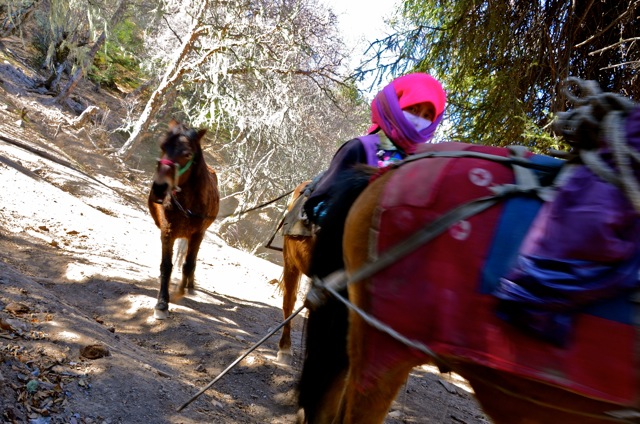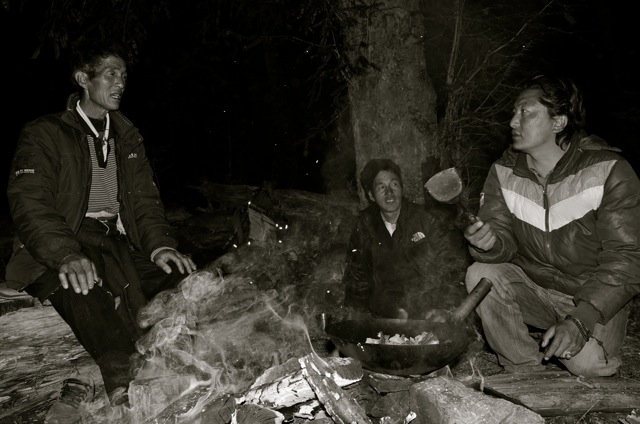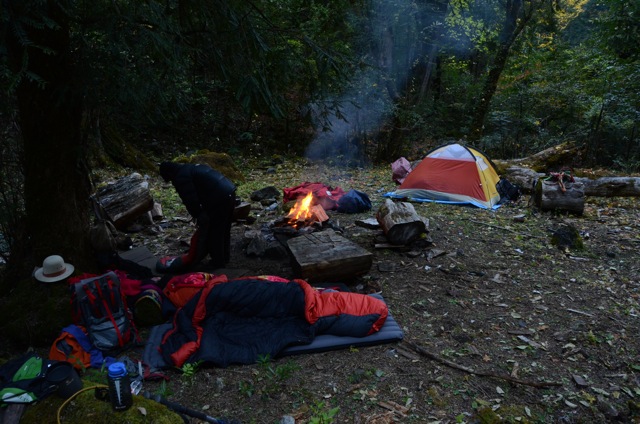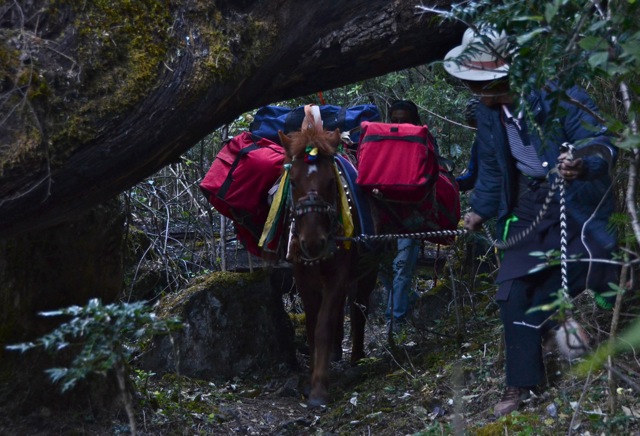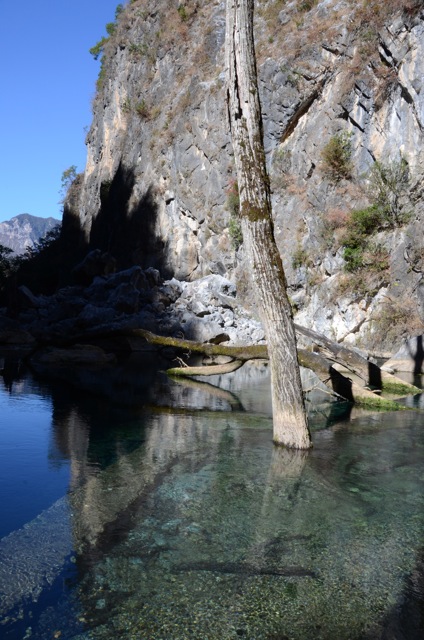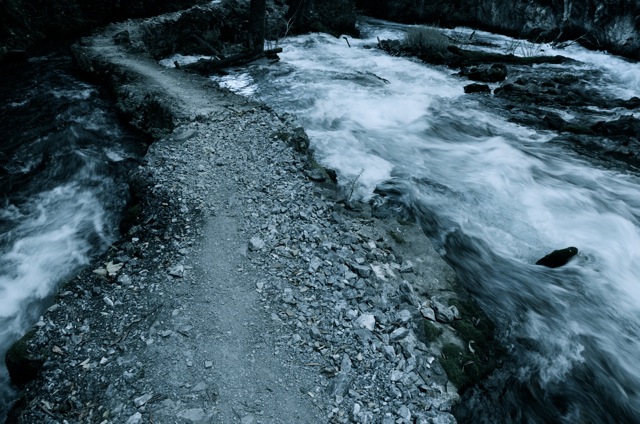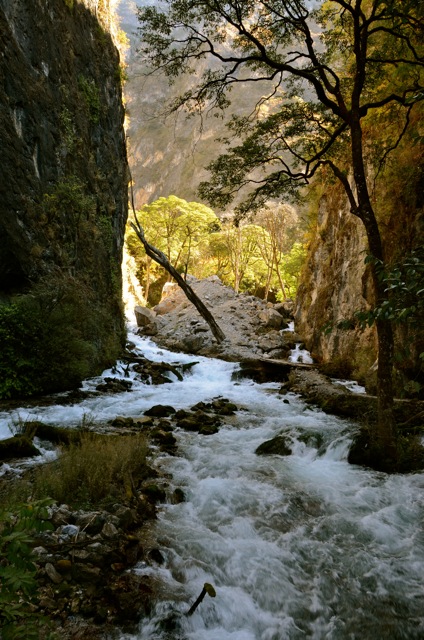What is eternally rivetting about the mountains is their ability to hold traces of what has come before on their surfaces, while simultaneously holding unimaginable power. Tucked away, under forest cover, within valleys, and particularly on the stone, the trails we seek – and travel upon – are there. The have been hidden only until we spot vestiges of them, and then, even if briefly, they come back to life. Oceans and seas obliterate and erase but mountains and their isolated heights are able to preserve a kind of scarred history of life upon them.
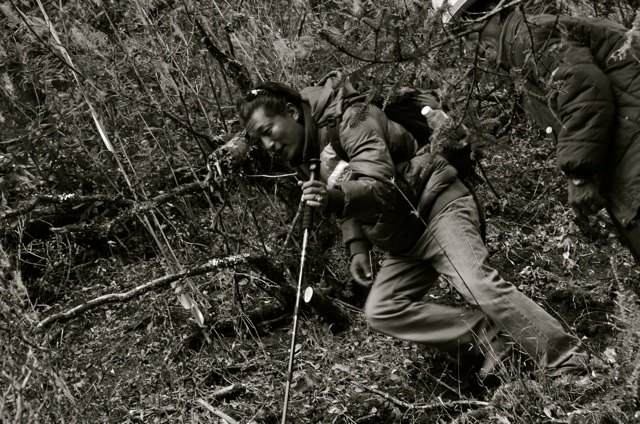
Yanpi half plunges, half stalks along a small pathway through the dense forests. At times we are not sure whether we are on the right route or not.
Our team makes its way along a path of dirt in the dry air that looks to have been dug with a small spoon a long time ago. In history, the route we are upon was used as an access path from the Yangtze River’s valley communities to Gyalthang (Shangri-La), but its extender routes (those which we will follow) have far more interest to us: passageways that weave their way to that old friend of mine (and my eternal obsession) the Tea Horse Road. In these parts, the elders still refer to that ‘road’ as the Dre’lam or Dru’lam (mule road). It could also be referred to as simply “the route of feet”. Anything with feet carted something of value to someone, somewhere.
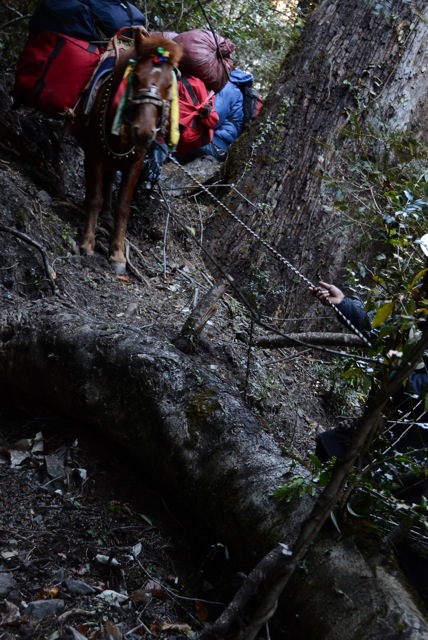
Our horse simply stops at one point and refuses to continue. It takes 10 minutes of coaxing to get him to move. He makes his point though…
During a break, Ngawa tells us of how for a seven-year period from the time he was 13 he took part in caravans hauling everything from clothing to fruit along these pathways to and from his poor village. Walnuts, peppercorns, salt, and of course that great distinguished green leaf, tea, were all carted on the backs of men and mule along this route. Little in the past three or four decades has passed along here except for gangs of wild horses, or the occasional herders.
Ngawa smokes whenever there is a break in our movement, but carefully dabs his cigarette butts out in a puddle of his own saliva to ensure there is no chance of fire. Fire and its risks here, in this paradise of wood, is beyond deadly; it runs against the very spirit of our endeavor. Ngawa with his limitless strength and energy seems at odds with his habit but I’d long learned not to try and make sense of ‘habits’.
Songjè tells us of how when he was young he would bring his yak herds up here to graze, but now that has faded to an end as well. It feels as we follow Ngawa’s lead, that nature is preserving these portions of trail while at the same time obliterating it. Time cares not about sentiment and so it remains vital that we not only travel the route but that something is taken down about this pathway, something is passed along and remembered.
Yanpi, stylish as ever, wanders ahead to Ngawa to share some words as they are both from warm valley towns along the Yangtze and share the same dialect and sense of humor. Tenzin, who is stooped over with his load is off on his own, which seems to suit him fine. He is often lost in thought, with a grimace or frown on his face as if he is in some kind of eternal problem solving mode. He tells me that his mind “gets very busy” when he treks, though whether he actually solves any of his problems I never know.
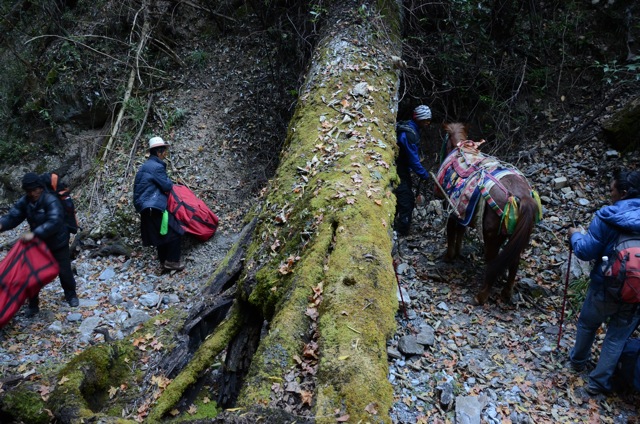
Unloading the horse we must take all of our gear under the ‘bridge’ and then reload on the other side.
We head west over the Shika Range, then south through small dark valleys of shadowy cold. Sun and its effects are rarely felt in some of the tight wedges that we travel through. Mosses hang from trees and at times we must hold up while one of us hacks through the foliage so that our horse may pass through unscathed. At three points during our journey we must unload everything off the horse while it passes under trees – enormous trees – which have fallen across our path. They create massive obstacles but we’ve no choice. We are literally walled in on either side and there are no alternatives. For some an expedition is a search, for others a meditation, and still others view it as a physical endeavor and necessity. Our own journey has the advantage of being a journey without certainties of exact times and places.
Our route follows the natural confluence of the land, and we dip and bend with the route. The route is what matters and it is the route that holds us to its every meter.
Ngawa, Songjè, and Yanpi all take turns explaining the various plants and their medicinal properties. Songjè tells us of a time when virtually ever single plant and tree had a function and benefit. He gets younger as he speaks and as his body takes in the geography, his body seems to lighten.
Everyone in our group has a different speed. Ngawa with his big engine wishes to race through the environment, while Yanpi seems to take great pleasure is simply staring into the damp undergrowth and savouring each new little vista. Songjè, as always, simply wants to make the route for his horse as smooth as possible. My own mind is intent on the route itself and I often find my mind drifting back to a time when this route upon which we travel hummed with activity and life. We make it to just under 4,000 meters before gradually descending.
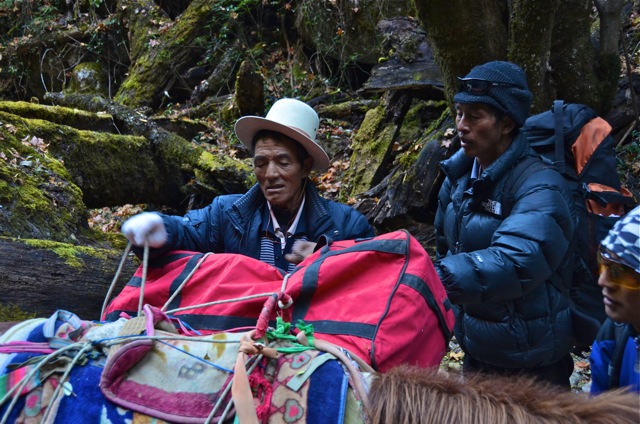
Songjè grumbles while reloading for the 5th time in a day, while Ngawa tries to make himself helpful
Ngawa’s father, now in his late eighties, was a muleteer (“la’do” in Tibetan, meaning “hands of stone”) who traveled the length of Yunnan, deep into Tibet and even on into India hauling any good that had value. In some ways I think Ngawa is slightly envious of the adventure-life of his father. Ngawa confesses at one point on our walk that “he travelled the Himalayas, slept under the stars, saw the ‘world’, and had twelve children”. Yes, a bit of envy. We will in the course of this journey meet up with the old man and I wonder if that is why Ngawa wishes to move so fast.
At one juncture we are faced with a dilemma that ‘almost’ becomes ugly. Before us, an almost vertical drop, which is accessed by a path a mere meter wide. On one side a plunge meters deep and on the other side a sheer wall that shoots thirty meters high, under which the little path goes down. We have no choice. Our only alternative to moving on is to turn back, though we won’t turn back; this isn’t something we’ll consider. Even for those of us with two legs, this pathway will take a delicate bit of prancing to get down; for our horse it will be nearly impossible with its wide bulging load. Songjè starts to growl his displeasure, telling us that his “horse will die on this journey”, and that “I wasn’t told we’d be ‘climbing’”. He even dramatically suggests that this is “too much”. The rest of us know that we must keep Songjè happy. We speak to him with soft reason, and start gently unloading his horse, though he tells us we’re being sloppy and rough pushing us away. Tenzin is running around doing anything he can, while Ngawa is offering a cigarette to Songjè to placate him. Yangpi simply smiles and winks at me. He knows this is a delicate game.
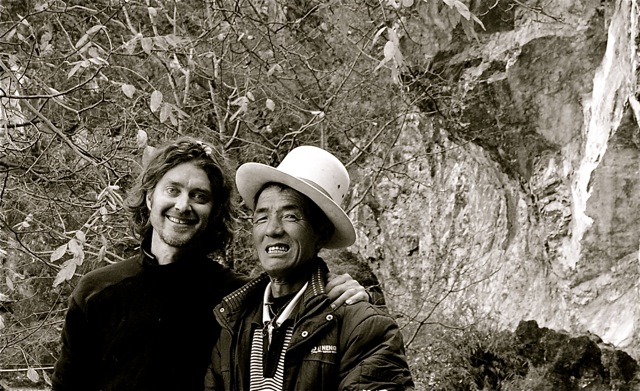
Here a pensive Songjè (right) poses uncomfortably with me while we try to ease his troubles. He isn’t happy with the route and we must find ways to placate him. At the end of each day though, he is content and tells us how much he enjoys the challenges…but every day we worry that he quit. He never does.
Each bag is taken off of our horse and carefully carried down the slope by us, then our horse is carefully led down the stones without the burden of its load. At one point the horse simply stops and then without any warning it starts to slide down, while madly scrambling its four hooves to gain traction. Songjè’s face is dark with concern, while Ngawa suddenly takes charge, grabbing the horse’s reigns and forcefully pulling the frantic animal. While he does this he issues out a series of screams, whistles, and urgings at the horse. The horse seems to sense that Ngawa’s force of personality inspires confidence and regains control of its skittish legs.
Ngawa is a rough but competent man and the horse comprehends this. As we load the horse back up having safely made it down the plunge, Songjè looks at Ngawa with and tells him “Next time, treat the horse my way, not your way. It doesn’t understand your methods”. Having said that, there is in his voice some grudging respect and perhaps even a little gratitude.
Hours later with the sun long gone, we have slowed the pace and enter into a valley that smells of an almost sumptuous scent. It is as though we’ve suddenly walked into a different room, so powerful is the effect. Dark cold is coming out of the earth, but that scent which is almost narcotic seems to overpower all of the senses. Setting up camp with our fire humming in the blue black of coming night, Tenzin tells me that the entire valley is populated by Sandalwood trees, which is what is giving off the perfumed aroma. He grabs needles from one of the trees and throws them into the fire. The smoke-filled air turns magic with the oil of the needles having been released.
Tenzin sets up a tent and then immediately begins preparing four nuclear-strength cups of Nescafè. He knows I will take my Puerh tea rather than his powerful elixir of muddy colour. Songjè tells us that he needs something “sweet”. Tenzin takes this to mean that he will add a horrendously large amount of sugar in Songjè’s coffee. When I ask Songjè if he’s ever even had coffee, he shakes his head in the negative. “But I need something after today”.
Songjè will not sleep on this night. His sleeping bag is next to mine and the entire evening he spends turning over and complaining. Two cups of coffee and a potent amount of sugar for a novice will do this.
At 7:30 am the next day we march out of our camp, and by 9 am we move out of the forest’s cool grip and down into the pulverizing heat of the Yangtze River valley. I immediately miss the forests fresh embrace, as the heat is overwhelming. Only Ngawa continues to move forward quickly. We will meet his father tonight in a small town with no roads and spend the night thirty meters away from a portion of the caravan trail. But first more heat.

